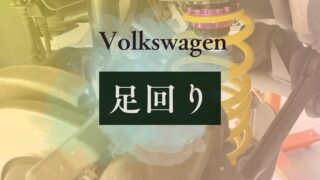Volkswagen (VW) is renowned for its ability to balance driving performance with ride comfort.
One reason VW cars feel so stable and smooth on the road is their well-engineered suspension systems.
The suspension connects the tires to the car body and absorbs shocks from the road while maintaining vehicle stability.
However, suspension components wear out over time, and neglecting them can compromise both ride quality and safety.
This article explains the symptoms and causes of VW suspension issues, risks of ignoring the signs, estimated repair costs, and how you can inspect your suspension at home.
Common VW Suspension Repairs and Costs (Estimate)
| Service | Estimated Cost (incl. tax) | Notes |
|---|---|---|
| Shock absorber replacement (front and rear) | ¥100,000–180,000 ($670–1,200) | Using genuine parts |
| Coil spring replacement | ¥50,000–100,000 ($335–670) | Extra labor for adjustable kits |
| Bushing & mount replacement | ¥30,000–70,000 ($200–470) | Includes disassembly and reassembly |
| Stabilizer link replacement | ¥20,000–40,000 ($135–270) | A relatively low-cost repair |
| Full suspension replacement (incl. sport upgrades) | ¥200,000–400,000 ($1,350–2,700) | For high-performance applications |
Note: Using aftermarket or rebuilt parts can reduce costs, but it’s recommended to choose genuine or trusted aftermarket components for VW vehicles.
What Is a Car Suspension?
A car’s suspension system plays a key role in delivering ride comfort and driving stability.
VW suspensions are especially well-tuned to balance comfort with sporty handling.
Key suspension components include:
- Shock absorbers (dampers)
- Springs (coil springs)
- Lower and upper control arms
- Stabilizer bars
- Bushings (rubber dampers)
These work together to absorb road bumps and stabilize the vehicle.
Common Symptoms of VW Suspension Problems
If your VW suspension is failing, you’ll likely feel noticeable differences while driving.
Here are some common signs to watch for:
1. Rough Ride Quality
If you feel increased vibration or harshness even over small bumps, your shock absorbers may be worn.
2. Excessive Body Sway or Unstable Handling
If the car feels unstable in corners or sways after bumps, the springs or bushings may be worn.
3. Unusual Noises
Clunking, squeaking, or knocking sounds when driving over bumps can indicate worn shocks or loose components.
4. Uneven Ride Height
If your car sits unevenly when parked on a level surface, the coil springs may be sagging or broken.
Common Causes of VW Suspension Issues
Suspension parts are under constant stress and degrade over time. Common causes include:
• Worn Shock Absorbers
Over 80,000–100,000 km (50,000–60,000 miles), shocks can lose damping strength due to oil leaks and internal wear.
• Coil Spring Fatigue
Springs lose elasticity over time, causing lowered ride height and poor ride quality.
• Worn Bushings and Mounts
Rubber bushings crack and harden with age, leading to noise, vibration, and poor handling.
• Worn Stabilizer Links
These components stabilize the car during cornering but may loosen or wear out with use.
Risks of Ignoring Suspension Problems
Leaving suspension issues unresolved can increase the risk of:
- Severely degraded ride comfort
- Uneven tire wear (shorter tire life)
- Longer braking distances due to instability
- Reduced cornering grip (higher rollover risk)
- In severe cases, accidents from component failure
At high speeds or in bad weather, suspension failure can be catastrophic.
Never ignore signs of trouble.
DIY Inspection and Prevention Tips
While most suspension parts are hidden, there are simple checks you can do:
• Feel the Ride Over Bumps
If bumps feel harsher or body sway lasts longer, your shocks may be worn.
• Check for Uneven Ride Height
Park on a level surface and measure the distance from ground to fender on both sides.
If one side sits lower, have it checked.
• Listen for Unusual Noises
Any knocking or squeaking noises from the suspension should be addressed immediately.
• Get Regular Inspections
Have your suspension checked during routine maintenance or every 12 months, especially if your car has over 50,000 km (30,000 miles).
Final Thoughts: Suspension Is Key to VW Ride Quality
VW’s smooth, sporty ride depends on a well-maintained suspension system.
Because these parts are constantly stressed, early detection and regular maintenance are essential.
If you notice any unusual ride characteristics, get your car inspected immediately.
Ignoring early signs will lead to higher repair costs and increase safety risks.
Stay aware of your car’s suspension to keep your VW performing at its best for years to come—and enjoy every drive with confidence.








コメント